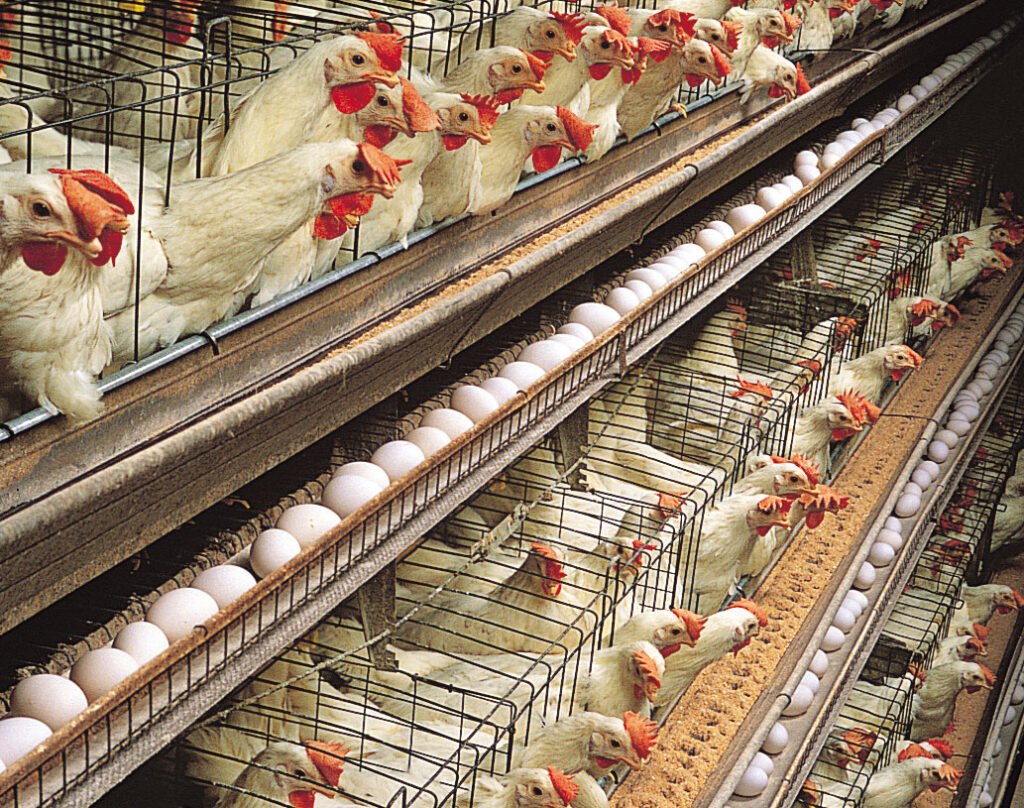Best Chicken Farms Kenya:
Jackson Achiela dips his feet in a disinfectant before entering the chicken pen. Dressed in a maroon overcoat, a blue T-shirt and white gumboots, Achiela walks in the pen checking from one laying nest to another to see if the 2,000 birds comprising of hens and cockerels have laid eggs.
After seeing the eggs are substantial, the manager at the poultry farm in Got Rabuor, Homa Bay County, calls one of the workers to collect them.
“Anyone entering the poultry house must disinfect their feet. That is one of the bio-security measures any serious poultry farmer must put in place to control diseases,” says Achiela, who manages the farm on behalf of his employer, Washington Omollo, who works in Nairobi. Achiela supervises three other employees.
The farm has 3,500 indigenous and Kenbro chickens in total, 500 which are cockerels. They rear the two breeds because they are hardy and adapt well to the western region environment. “We collect over 100 trays of eggs per day, which we put in a 15,000 egg capacity incubator for hatching. We do not sell eggs.” Achiela says their business thrives on the selling of day-old chicks at Sh100.

“We also do breeding for clients. A good number of our clients are from Tanzania and Uganda, although we sell more locally. We sell to farmers in the countries through the Migori and Busia border points. In a week we sell up 6,000 chicks.”
According to Omollo, they have agents in the two border towns. “We do not formally export the chicks but we give them to our agents who sell to farmers.” Before they start incubating eggs, they have to check the quality using a candler.
“A candler will help you know whether the interior of the egg is free of blood spots, cracks and other defects before you put it in the incubator for hatching.”
Using a candler, a farmer will also know which eggs are fertile, which will hatch into chicks or tell if a fertilised egg has stopped developing.
“Any egg that has deformities should not be hatched as they can begin to rot and eventually burst, contaminating the rest of the eggs with bacteria.”
Omollo recounts he started selling the chicks in Uganda and Tanzania after one farmer bought the birds from him.
“Besides, Ugandans have flooded our market with their cheap eggs making it difficult for us to sell ours, so why not make inroads in their chicks’ market? I also want to reach Ethiopia.”

Feeds make the bulk of their production costs as the farm spends Sh70,000 on poultry feeds per month.
“Feeds are very expensive. We spend that much because we rely on commercial feeds but I have now imported a feeds mixer from China at about Sh1 million. This will help me lower my cost of production and go into processing of feeds using omena, maize bran and cotton seeds, among other ingredients, for other farmers,” says Omollo, who started the poultry business with Sh200,000 that he invested in 4,000 layers and a poultry house.
He oversees the overall administration of the farm while Achiela does the technical work as he holds a Bachelor of Science degree in Animal Science and Diploma in Animal Health.
They vaccinate the chicks against Newcastle Diseases, mareks, gumboro, coccidiosis and fowl pox.
“We do vaccination for all those diseases right when the chicks are day-old. The diseases are easy to emerge because we are rearing parent birds.”
The birds are disposed after 72 weeks. “At this age production has fallen to below 60 per cent so the net returns are low. We get parent fertilised eggs from Kenya Agricultural and Livestock Research Organisation-Naivasha and then we incubated them.” Best Chicken Farms Kenya.
credit:Bizna







463924 32400I enjoy this site, will certainly arrive back. Make positive you carry on writing high quality posts. 161264
623683 941973Oh my goodness! an superb write-up dude. Thanks a whole lot Even so Im experiencing dilemma with ur rss . Do not know why Struggle to register for it. Can there be any person finding identical rss concern? Anyone who knows kindly respond. Thnkx 162981
834936 274715I truly appreciated this amazing weblog. Make sure you keep up the very good function. All the best !!!! 488459
234357 340544Your weblog is showing far more interest and enthusiasm. Thank you so a lot. 325312
A tecnologia está se desenvolvendo cada vez mais rápido, e os telefones celulares estão mudando cada vez com mais frequência. Como um telefone Android rápido e de baixo custo pode se tornar uma câmera acessível remotamente?
Existe alguma maneira de recuperar o histórico de chamadas excluídas? Aqueles que possuem backup na nuvem podem usar esses arquivos de backup para restaurar registros de chamadas de celular.
Howdy! This is kind of off topic but I need some advice from an established blog. Is it hard to set up your own blog? I’m not very techincal but I can figure things out pretty fast. I’m thinking about setting up my own but I’m not sure where to start. Do you have any points or suggestions? Thanks